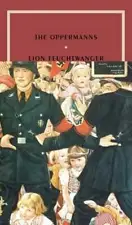Benny Profane
Well-known member
I've discovered this very forgotten writer.
An important influence for Bert Brecht and other german languange's playwrights, he was a Jewish author who criticized a lot the Nazi Party's accendent in Germany.
He found asylum in United States and died in 1958.
According to his article on Wikipedia, here are his works:
Has anyone here read anything by him?
An important influence for Bert Brecht and other german languange's playwrights, he was a Jewish author who criticized a lot the Nazi Party's accendent in Germany.
He found asylum in United States and died in 1958.
According to his article on Wikipedia, here are his works:
- Die häßliche Herzogin Margarete Maultasch (The Ugly Duchess), 1923 —about Margarete Maultasch (14th century in Tyrol)
- Leben Eduards des Zweiten von England (The Life of Edward II of England), 1924: written with Bertolt Brecht.[15]
- Jud Süß (Jew Suess, Power), 1925.
- The Wartesaal Trilogy
- Erfolg. Drei Jahre Geschichte einer Provinz (Success: Three Years in the Life of a Province), 1930
- Die Geschwister Oppermann (The Oppermanns), Querido, 1933; published in an English translation by James Cleugh, by Secker, 1933[16]
- Exil (Paris Gazette); German-language edition published by Querido, in Amsterdam, 1940; published in an English translation by Willa and Edwin Muir, by Viking, 1940[17]
- The Josephus Trilogy—about Flavius Josephus beginning in the year 60 in Rome
- Der jüdische Krieg (Josephus), 1932
- Die Söhne (The Jew of Rome), 1935
- Der Tag wird kommen (Das gelobte Land, The day will come, Josephus and the Emperor), 1942
- Marianne in Indien und sieben andere Erzählungen (Marianne in Indien, Höhenflugrekord, Stierkampf, Polfahrt, Nachsaison, Herrn Hannsickes Wiedergeburt, Panzerkreuzer Orlow, Geschichte des Gehirnphysiologen Dr. Bl.), 1934—title translated into English as Little Tales and as Marianne in India and seven other tales (Marianne in India, Altitude Record, Bullfight, Polar Expedition, The Little Season, Herr Hannsicke's Second Birth, The Armored Cruiser "Orlov", History of the Brain Specialist Dr. Bl.)
- Der falsche Nero (The Pretender), 1936—about Terentius Maximus, the "False Nero"
- Moskau 1937 (Moscow 1937), 1937
- Unholdes Frankreich (Ungracious France; also Der Teufel in Frankreich, The Devil in France), 1941
- Die Brüder Lautensack (Die Zauberer, Double, Double, Toil and Trouble, The Lautensack Brothers), 1943
- Simone, 1944
- Der treue Peter (Faithful Peter), 1946
- Die Füchse im Weinberg (Proud Destiny, Waffen für Amerika, Foxes in the Vineyard), 1947/48 - a novel mainly about Pierre Beaumarchais and Benjamin Franklin beginning in 1776's Paris
- Wahn oder Der Teufel in Boston. Ein Stück in drei Akten ("The Devil in Boston: A Play about the Salem Witchcraft Trials"), Los Angeles 1948.
- Odysseus and the Swine, and Other Stories, 1949; a collection of sixteen short stories, some published in book form for the first time (London: Hutchinson International Authors Ltd, 1949)
- Goya, 1951—a novel about the famous painter Francisco Goya in the 1790s in Spain ("This is the Hour" New York: Heritage Press, 1956)
- Narrenweisheit oder Tod und Verklärung des Jean-Jacques Rousseau ('Tis folly to be wise, or, Death and transfiguration of Jean-Jaques Rousseau), 1952, a novel set before and during the Great French Revolution
- Die Jüdin von Toledo (Spanische Ballade, Raquel, The Jewess of Toledo), 1955
- Jefta und seine Tochter (Jephthah and his Daughter, Jephta and his daughter), 1957
Has anyone here read anything by him?
Last edited:

